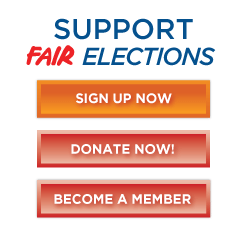It took weeks of legal suits and an emergency ruling by the
California Supreme Court to compel Americans for
Responsible Leadership to reveal its hidden funding
sources. The shadowy Arizona nonprofit caused an uproar by
funneling $11 million of secret money into California,
trying to buy results on Proposition 30 and Proposition
32.
The California Fair Political Practices Commission called
it "the largest contribution ever disclosed as campaign
money laundering in California history."
Despite such heroic legal efforts and the egregious
secretive attempt to manipulate our elections, all that was
revealed was that the money came from two other
out-of-state nonprofits that also conceal their donors. The
only hint of their donors' identities - information voters
overwhelming want - is that they're connected to the
billionaire Koch brothers. We need to restore sanity and
transparency to our elections by passing the California
DISCLOSE Act.
Luckily, this time the "dark money" contributions backfired
due to media coverage and the unseemliness of $11 million
of laundered out-of-state money trying to buy our
elections. But it shouldn't take last-minute Supreme Court
rulings to reveal who is behind political ads.
Clearly, we need to require any organization that spends
significant money on California campaigns - including
Arizona nonprofits - to report the sources of those
funds.
But that alone won't be enough. Most of the $372 million in
ballot measure spending this year was on initiatives either
put on the ballot by billionaires and corporations or
opposed by them. Though most of their spending was actually
reported on the secretary of state's website, most voters
didn't know because they don't visit it.
Instead, voters see an avalanche of ads with fine print
disclosures referring to misleading names like "Stop
Special Interest Money Now" or "The 2012 Auto Insurance
Discounts Act."
Because of this, vast sums are wasted simply educating
voters about who is funding the other side. For example,
opponents of Proposition 23, the initiative that would have
repealed California's landmark climate change laws, spent
more than $30 million explaining it was funded by Texas oil
companies Valero and Tesoro.
Californians deserve better. We deserve to know who is
behind political ads when we see them.
Fortunately, there's a growing consensus on how real
disclosure on political ads should look. Assembly Bill
1648, the California DISCLOSE Act, authored by
Assembly member Julia Brownley and sponsored by the
California Clean Money Campaign, required television ads to
clearly list their top three funders - and their logos - on
a full screen with black background for three seconds. It
also required them to list a website containing more
funding details. Radio and print ads must have similarly
clear disclosures so there's no mistaking who's behind
them, either.
There is vast support for the California DISCLOSE
Act. More than 84,000 Californians signed petitions
urging the Legislature to pass it - a remarkable number for
a bill. In addition, more than 350 organizations and
leaders endorsed AB 1648, including the League of Women
Voters of California and California Common Cause.
California Church Impact called it a "profound moral
issue."
President Barack Obama and national Democrats have pushed
for a similar national DISCLOSE Act, only to be
stopped by Republican filibusters despite polls showing
Republican voters overwhelmingly support increased
disclosure, just as all voters do.
Fortunately, California doesn't have to worry about
filibusters. Despite heavy lobbyist opposition, AB 1648
passed the Assembly thanks to the leadership of Speaker
John A. Perez, a co-author. Every Democrat and independent
voted for it or the previous version.
Unfortunately, it was too late to also pass the Senate this
year, but the bill will be reintroduced next year. With
strong support in the Senate and Perez's promise that he
will get it through the Assembly again, the California
DISCLOSE Act stands a good chance of passing.
Californians should settle for nothing less. Real
disclosure reform must not only force secretive
organizations to report who provided their campaign
funding, but also change disclosure on ads themselves so
voters have the crucial knowledge about who is paying for
them, when they see them. Californians' ability to
determine the future of our state is at stake.
Trent Lange is president of the California Clean Money
Campaign, the sponsor of the California DISCLOSE Act.




